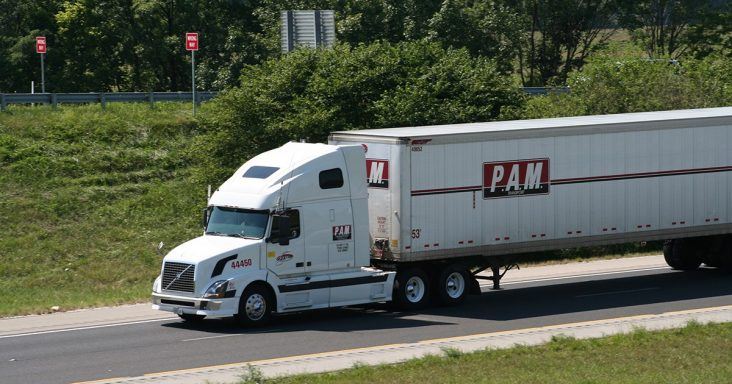P.A.M. reports loss in first quarter; customer plants close in wake of COVID-19 pandemic
by April 14, 2020 8:20 pm 1,102 views

Tontitown-based carrier P.A.M. Transportation Services Inc. said a net loss was driven by stock market losses in the first quarter while revenue was up marginally.
After the markets closed Tuesday (April 14), P.A.M. reported a $1.3 million loss, or a loss of 23 cents per share, in the first quarter, compared to net income of $8.3 million, or $1.39 per share, in the same period in 2019. Revenue rose narrowly to $129.15 million, from $128.68 million.
Revenue per mile rose 3 cents to $1.69 in the first quarter, while revenue per truck per day fell $30 to $671. The company had an average of 1,584 company trucks and an average of 544 owner-operator trucks.
In its logistics operations, revenue increased slightly to $20.51 million, from $20.33 million. Operating ratio was 97.53%, compared to 92.43% in the same period in 2019.
“We started off 2020 with very strong operating results as both January and February each ranked in the top three best January and February operating results in the company’s history,” President Daniel Cushman said. “March started off strong, and then of course we encountered the very unexpected chain of events that took place around the world. Despite the slowdown that began around the middle of March, we were able to hold our own for those last two weeks and finished the first quarter of this year with operating results that were very close to the record-setting first quarter operating results of last year.”
The company had prepared for plant downtimes in April with its largest customer when businesses started to slow in reaction to the COVID-19 pandemic, Cushman said. The carrier had considered its options to generate revenue during the scheduled three-week closing and had started to find opportunities for this period “when we saw the writing on the wall that COVID-19 was not only going to severely interrupt the supply chain network, it was going to change life as we knew it,” he said.
“Things began to happen very quickly, and in a matter of days, we saw all the automotive plants cease operation. This meant that approximately 45% of our revenue stream was no longer available, and while I don’t really like having to learn life lessons from trials and tribulations, that seems to be where lessons come from.”
Cushman noted the carrier’s experience last year regarding the six-week strike at General Motors and that the company remained profitable in that period. Concerning the existing crisis, the carrier was notified that all automotive plants would close in the week of March 15.
“Fortunately, we have also developed a strong non-automotive customer base over the last 10 years, many of which provide what was deemed ‘essential goods’ during this crisis,” Cushman said. “We were able to redeploy drivers that have been hauling automotive freight to those customers.”
The carrier also reached out to other transportation companies to see if they needed additional capacity, and those that were hauling essential freight accepted the offer. The shipping surge slowed in April, but Cushman expects to keep the company’s fleet productive over the next few weeks in anticipation of automotive plants resuming production. All the plants expect to restart production by late April and into early May, he said. The carrier does business with every automaker in North America, but they don’t haul all the freight in this sector, Cushman said. And while automotive sales are expected to fall in 2020, this is expected to translate to lower revenue for the carrier, he noted.
The company’s Mexico division is one of its most profitable divisions with the greatest growth, he added. The company recently purchased a new terminal in Laredo that more than triples its footprint in the region. Also, a rise in dedicated capacity as a result of hauling relief aid in the health crisis is expected to lead to more growth throughout 2020.
Shares of P.A.M. (NASDAQ: PTSI) closed Tuesday at $38.12, down $1.87, or 4.68%. In the past 52 weeks, the stock has traded between $71.56 and $22.
LIQUIDITY CONCERNS
The company receives about half of its revenue delivering auto parts primarily to auto plants, and most of those plants closed in mid-March, according to a new Seeking Alpha report. And when they reopen, revenues are expected to fall as a result of a recession. From 2007 to 2009, revenue fell 29%, and the carrier lost money between 2008 and 2011, which includes two years after the recession ended.
Meanwhile, the carrier’s value is higher than other trucking companies that handle less freight for closed industries, according to the report. P.A.M. has a limited amount of liquidity and long-term debt that will be due soon. The report noted the carrier might not have enough liquidity “to get through this year” and might violate its financial covenant this year or early next year. As of March 25, P.A.M. had laid off 75 employees, the report shows.
A recession is expected to help resolve a tight labor market in the trucking industry, but the report shows the pandemic has created a new labor issue: drivers having a difficult time finding open restaurants.
A strength the report listed was P.A.M. has a new fleet of trucks, with an average age of 1.46 years. This should allow the carrier to defer new truck buys. Trucks typically are replaced or refurbished after three years. As of the end of 2019, P.A.M. had 2,130 trucks and 7,081 trailers. General Motors, Chrysler and Ford accounted for 35% of revenue in 2019, down from 37% in 2018. About 20% of the carrier’s business can be attributed to the retail industry, and about 36% of its freight travels to or from Mexico. Cross-border freight accounts for about half of its revenue.
